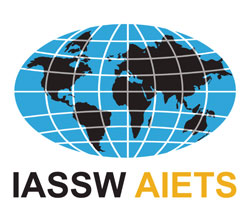Global Agenda for Social Work and Social Development
IASSW Statement
Theme 3: Promoting environmental and community sustainability
The Global Agenda for Social Work and Social Development (2012) reflects the commitment of social workers, social development practitioners, educators, and international, national and local organisations to contribute to the 2030 Agenda for Sustainable Development. In preparing for the Post-2015 Development Agenda, the International Association for Schools of Social Work (IASSW), the International Federation of Social Workers (IFSW), and the International Council on Social Welfare (ICSW) collaborated and consulted over a three-year period on the sector’s role which culminated in adopting the Global Agenda in 2012. In working towards a better future, the starting point was to recognise collectively the unequal consequences of political, economic, social, cultural and environmental orders in specific contexts and the negative impacts these have on people and their ecosystems, as is evident in global, national and local communities (Global Agenda, 2012).
The Global Agenda commitments, configured around four themes, are respectively promoted and researched with regard to best practices and challenges – across the world through Regional Observatories – in cycles of two years per theme. These are:
- Promoting social and economic equality
- Promoting the dignity and worth of peoples
- Promoting environmental and community sustainability
- Strengthening recognition of the importance of human relations
Themed Global Agenda Reports are launched at the bi-annually joint World Conference on Social Work, Education and Social Development. The Global Agenda report for Promoting social and economic equality was launched at the joint World Conference in Sydney, Australia, in 2014. The second Global Agenda report on the theme: Promoting the dignity and worth of peoples, was launched in Seoul, Korea in June, 2016. The Global Agenda’s current theme for research in the next two years (2016 – 2018) towards a just and inclusive society is: Promoting environmental and community sustainability. This theme is introduced in this statement.
Protecting the natural environment is a key feature to promoting economic and social justice, particularly for poor people. It necessitates an emphasis on sustainable development. Nature will continue to provide humans with resources in the future only if they use them wisely in the present. Sustainability thus means that we have to meet the needs of current and future generations without exhausting either physical or human resources. When humans care for the earth, the earth will care for us.
Climate change and the rapid depletion of natural resources are affecting the lives of people in general. Large-scale drought is one of the effects of climate change. Drought means no water for agriculture, which in turn threatens food and nutritional security. Drought also causes ecological degradation including soil erosion, loss of animal and plant life, and loss of livelihoods. Natural resource depletion and the adverse impact of environmental degradation and pollution undermine the ability of communities to develop and grow. From a social justice perspective, sustainability denotes social and environmental interdependency. Clean air and water are important for reliable, sustainable food production, which in turn affect the health and wellbeing of humans and animals. Human and animal health directly influences income and asset building, which are critical in promoting social and economic inclusion upon which social stability rests. Social instability, exacerbated by structural inequalities and social concerns such as high crime levels, poverty and substance abuse, fuels political and armed conflicts. Further, it impacts negatively on the physical and human environment, especially when ordinances are used.
Climate change and environmental degradation affect al populations across the globe, but differently. For instance, people in some small island states, such as the Maldives and the island states in Micronesia, are being displaced by rising tides. Many of them lose their homes and lands, regardless of economic, social or political status. However, research shows us that the poor and marginalized are most vulnerable to the effects of climate change (UNISDR, 2014). People who are poor, typically live in socially and economically excluded communities lacking adequate infrastructure especially in water, sanitation, power and communications. They may also be affected by high crime rates and violence. The effects are particularly pernicious for children, women and older people, and those displaced by such crises (e polska-ed.com.g. (im)migrants, asylum seekers and refugees).
Sustainable development is about building healthy and inclusive societies, based on principles of social, economic and environmental justice. It recognizes the need to protect the environment and its resources for generations to come. Sustainable development initiatives are diverse in nature. They encompass policies, programs and services aimed at counteracting, or at least mitigating, the impact of climate change and environmental degradation. Some initiatives focus on improving access to water and sanitation, renewable energy for all, inclusive and safe housing and food security. Other initiatives address conservation of natural resources, halting and reversing air and land degradation, and halting loss of biodiversity. All of these advances are relevant to the sustainable development goals of building communities’ resilience and capacities, while simultaneously protecting the environment and combatting the negative environmental impacts of industrial development that treats resources as expendable.
Social work and social development educators and practitioners are well positioned to contribute significantly to the promotion of environmental and community sustainability. The profession is largely a human rights profession. Many of our existing perspectives, models, theories and practices focus on challenging structural injustices, advocating for peoples’ socio-economic rights and influencing policies. However, there is minimal attention to climate change and environmental degradation in our teaching, research and practice. For instance, social work contributions in areas such as disaster prevention, preparedness and recovery are inconspicuous. Ironically, even when we operate within an ecological theoretical framework, we tend to focus on interactions with the social environment, ignoring the natural environment. In order for us to remain steadfast in our commitment to human rights, a change is needed. It requires a political agenda within a human rights-based framework, and a holistic model which is rooted in social, economic and environmental justice (Dominelli, 2012).
The Global Agenda for Social Work and Social Development, especially the third theme, is aligned with the focus of the 2030 Agenda for Sustainable Development. They emphasise both people and the planet as important for sustainable development (SDG, 2015). These similarities were stressed in the social work response to the Sustainable Development Goals (SDGs) consultations in 2015 (Dominelli, 2015). By promoting environmental and community sustainability, the Global Agenda commits social workers, social development practitioners and organisations to align their activities and programmes with development initiatives that integrate environment and human dimensions. This includes strengthening established relationships with stakeholders from government, entrepreneurs, the media, academia, policy makers, civil society, and the United Nations and other international agencies, regional and national partners and organisations in order to reaffirm social work and the social development sector’s support for initiatives aimed at protecting the natural environment. Social workers and social development practitioners have to become involved with local communities and develop alternative sustainable models of socio-economic development that acknowledge global interdependency and the need to share green technologies. It is also important for community sustainability to respect human dignity which is strengthened and becomes visible when it includes the voices of peoples affected in the planning, developing, monitoring and evaluation of interventions promoting sustainable development on all levels – local, national, regional and global.
The International Association of Schools of Social Work (IASSW) is committed to the Global Agenda for Social Work and Social Development in promoting a just and inclusive world and a sustainable environment in harmony with communities and their environments through social work education programmes, educational strategies, social policy, and research. In achieving this, IASSW is committed to promote sustainable environments and communities by rethinking social work education in developing relevant theories and models, and promoting research that will facilitate harmony between the environment and peoples. IASSW commits social work education to prepare social workers with knowledge, values, and skills for professional practice through an ecological lens in responding to poverty, structural inequalities, socio-economic disparities, global interdependencies and limited natural resources. This should be achieved by protecting the environment while promoting the capacities and resilience of affected communities and their physical environments.
In going forward with Theme 3, Promoting environmental and community sustainability, IASSW reiterates its commitment to the principles which underpin the Global Agenda:
- Equitable development for every one across the world.
- Equitable distribution and claims on all resources by all people
- Social justice and environmental justice for all
We urge all members of IASSW to support or join our association in realising these principles through concrete projects in their institutions and communities. We also encourage you to share the projects with us through the IASSW website, by sending brief summaries of them and photos on the theme that have permission to be uploaded to Rashmi Pandey at rashmi@www.www.iassw-aiets.org.
References:
Dominelli, L. (2012) Green Social Work. Cambridge: Polity Press.
Dominelli, L. (2015) Social Work’s Response to the Consultations on the Social Development Goals. Durham: Durham University, School of Applied Social Sciences.
UNISDR (2014) World Disaster Report. Geneva: UNISDR.





